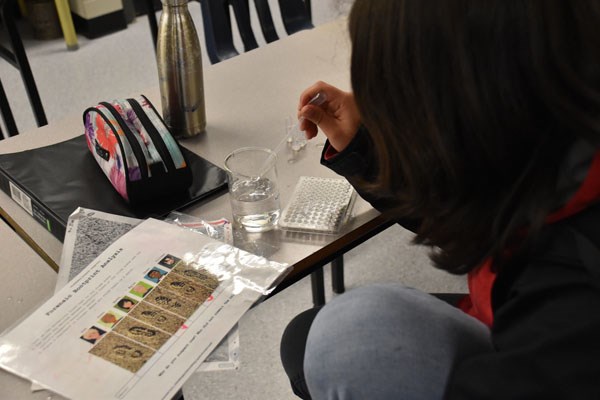A bloody knife, a canoe nearby and footprints on a sandy beach were a few pieces of evidence Grade 10 students at Elphinstone Secondary used to solve the puzzle of who killed Kyle. While suspect motives gave them ample ideas, the clincher came from genetics testing. The faux investigation served as part of a workshop organized by non-profit research organization Genome British Columbia to introduce students to the real-world application of genetics and forensics.
Last week, several workshops were facilitated at Elphinstone Secondary and Chatelech Secondary by Genome B.C. education manager Alex Chattwood. “We try and make things fun, we try and make them hands on and a little bit minds on,” he said after concluding a workshop on Friday, Nov. 9.
The Geneskool Education Program, which has been operating since 2006, is designed to give teachers lessons that combine content already taught in the classroom with simulated workplace activities, such as blood type testing, to demystify professions requiring genetics and genomics know-how. Aside from forensic science, workshops teach protein synthesis and genes inheritance.
“When they get into the real world and are doing real scientific things, they can draw on the same thought patterns they’ve been using in the activities and apply them to these new situations and try to answer questions that no one’s ever asked before,” Chattwood said.
“Genomics is this really quickly expanding field and it’s expanding into lots of different sectors,” said Chattwood, explaining the motivation behind the program. Genome B.C. is a non-profit research organization funded by the province and the federal government, as well as public and private organizations, with the aim to “develop a world-class genome sciences region,” according to its website.
Chattwood said he is hoping to create more continuity for teachers to avoid “parachuting” into classrooms with workshops but for now they hold full-day workshops at Capilano University in North Vancouver as well as a five-day summer camp for students who remain interested in the subject matter. “We try to give some roots and continuity that kids can pursue if they are interested, but in terms of fitting it into the curriculum, that is a thing we can do better at, for sure,” he said.
Grade 10 Elphinstone Secondary student Rowan, who solved the case, called the workshop “junior police training.” To solve the homicide, he and the class gathered at the scene of the crime, a diorama in the corner of Tim MacHattie’s Grade 10 science class. Students identified clues that they could analyze later – such as DNA, blood type and footprints. They also performed assessments of suspect motives. Initially, many appeared convinced fictional character Dean was guilty, but after analyzing blood types, a new name emerged to gasps from the class – Beth did it. “Some of us turned out to be police prospects,” said Rowan after all was over, adding that he enjoyed applying science they have learned in the classroom to a potential profession. “I think the school should be doing more stuff like this.”
More Coast workshops are scheduled for February 2019, with possible visits at Elphinstone, Pender Harbour and Powell River.



